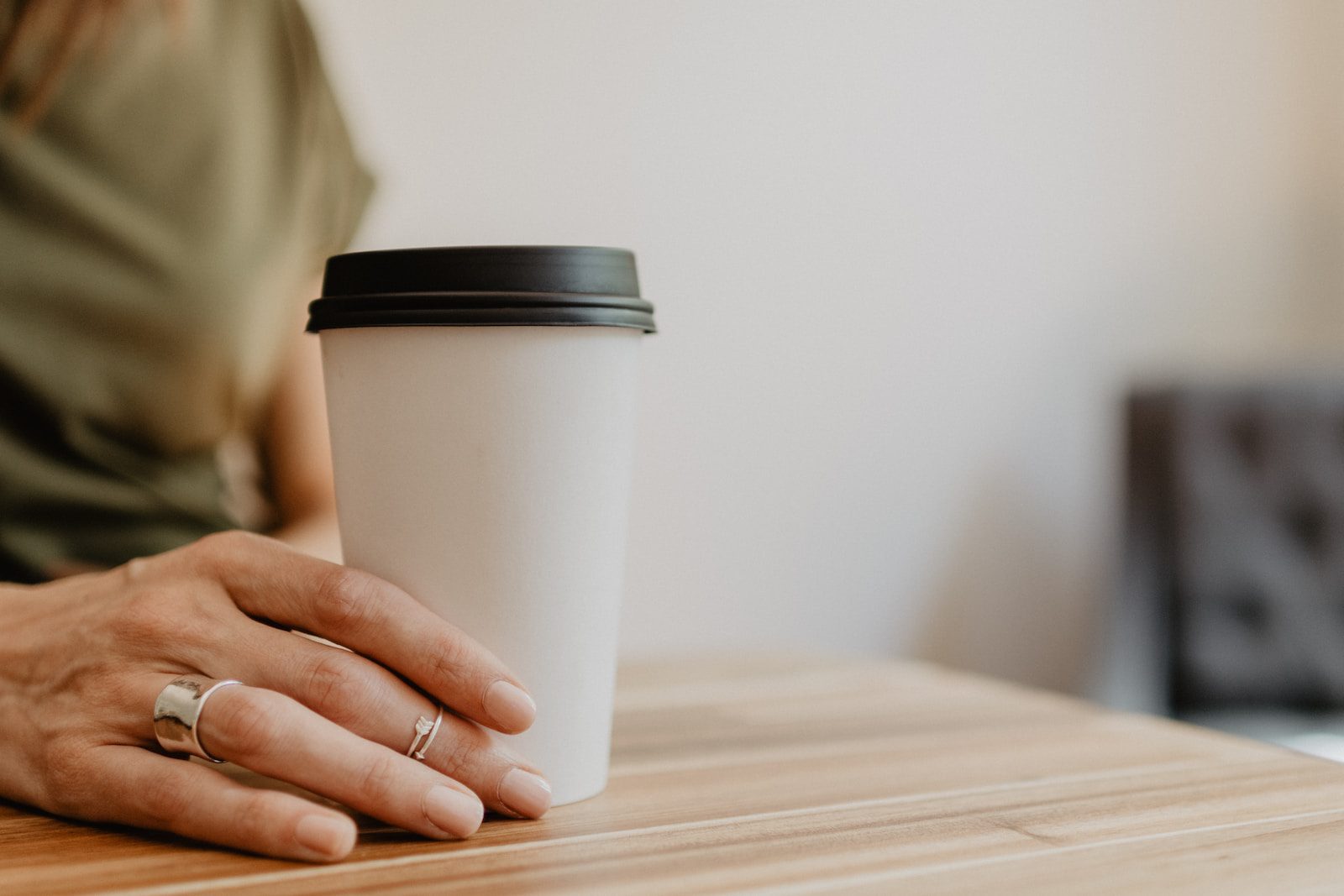1. Paper Coffee Cups
Unfun fact: Most paper coffee cups are lined with a plastic called polyethelene, which makes them difficult to recycle or compost. And when they’re exposed to hot liquid for a certain amount of time, they release plastic particles, harmful ions, and heavy metals into your drink.
Zero Waste Hack: Bring a reusable coffee cup when you go out! Many coffee shops will even give you a discount. Save money, create less trash and protect your health.
Check out this video on what happens when you try to compost a coffee cup (skip to 6:14 to see the final result).
2. Paper Plates
Unfun fact: Paper plates might seem like a good alternative to plastic, but many of them, even compostable ones, have a plastic coating containing PFAS (known as “forever chemicals”… more on this later in the series). These chemicals can leech into your food and cause all kinds of health problems like immune suppression and increased cancer risk. In fact, lots of paper food packaging like sandwich wrapper and take-out containers are coated in plastic to make them oil and water resistant. Opt for reusables instead!
Zero Waste Hack: If you’re going to a 4th of July BBQ or picnic today, bring a zero waste to-go kit so you don’t have to use disposable dishware. And if you’re a guest somewhere be sure to be as kind and non-judgemental as possible. Have fun with it and keep it light! The goal is to create a joyful movement that anyone can feel comfortable joining.
There are some disposable products that don’t contain PFAS, but the testing is limited and complicated, and they still use a lot of resources to produce. Reusable is always a better option!
3. Receipts
Unfun fact: Studies have shown that receipt paper is coated in plastic that contains BPA (a chemical with hormone-disruptive properties). These chemical can migrate through the skin into your bloodstream after you touch it. Yikes!
Zero Waste Hack: Ask for a digital receipt when possible or skip the receipt if you don’t think you’ll need it.
4. Gum
Unfun fact: There’s plastic in most chewing gum! The ingredient listed as “gum base” is made from any number of approved plastics, including:
- Butadiene-styrene rubber
- Isobutylene-isoprene copolymer (butyl rubber)
- Paraffin (via the Fischer-Tropsch process)
- Petroleum wax
- Petroleum wax synthetic
- Polethylene
- Polvinyl acetate
Who knew we were chewing a single use plastic all this time?!
Zero Waste Hack: Buy mints in recyclable metal tins.
5. Paper tea bags
If you’re a tea drinker, you might know to stay away from plastic tea bags since they’ve been shown to release billions of micro and nanoplastics while steeping your tea. But don’t stop there…
Unfun fact: Most teabags (even paper ones!) are sealed with polypropylene (i.e. plastic) that can leach into your tea and won’t break down in the compost.
Zero Waste Hack: Buy loose leaf tea in bulk and use a strainer, tea ball, or cloth tea bags.
6. Bottled Water
Unfun fact: Microplastics are all over the place, but especially in our water. And bottled water in particular is something to avoid because more than 90% of bottled water contains microplastics. And there are about twice as many microplastics in bottled water as there are in tap water.
Zero Waste Hack: You probably already know to bring your own water bottle with you to avoid having to buy bottled water, but it can be hard to remember to pack it! So here are a few memory hacks:
1. Write a note on your door until it becomes automatic.
2. Attach your keys to the handle of your water bottle.
3. Always keep your water bottle in your bag/backpack. When you take your bottle out to clean it, replace it with a new one right away so you’re never without one.
7. Clothing
Unfun fact: Many of the synthetic fabrics in our clothes like polyester, acrylic, lyrca, and nylon are actually… plastic! Some of the toxins in those plastics can be absorbed through our skin, and microplastics fill our waterways each time we wash them.
Zero Waste Hack: When buying clothes (hopefully second hand!) look for natural materials like cotton, silk, wool, hemp etc. And if you have to buy clothing made from synthetic materials, definitely get them second hand since they’ve had some time to “off gas” and are less toxic.
8. Sponges
Unfun fact: Most kitchen sponges are made of plastic and release tiny microplastics all over our dishes and into our waterways.
Zero Waste Hack: Use sponges made from natural materials such as cellulose, loofah, coconut husks etc. Or use dish scrubbers with wooden handles and replaceable heads. These materials can also be composted when you’re done with them!
9. All-purpose cleaner
Unfun fact: Many cleaning products with scrubbing agents contain microplastics. They’re also almost universally packaged in plastic bottles, which creates a huge amount of plastic waste.
Zero Waste Hack: Luckily, you can easily make your own cleaning products at home and it’s much cheaper too!
All purpose cleaner:
- Fill an old spray bottle with 1 part vinegar and 3 parts water.
- Add a little bit of essential oil or lemon juice (optional, since the vinegar is so diluted you won’t smell it when you’re done cleaning).
- Use for cleaning with zero waste rags cut from old t-shirts and towels etc.
- For tougher jobs, use baking soda in combination with this spray.
If you want even more recipes for plastic-free cleaners you can make at home, check out our pinterest. And if you’re not into making your own products, Blueland is a great option.
10. Makeup
Unfun Fact: Research shows microplastics are regularly found in makeup products like lipstick, rouge, foundation and eye shadow. These plastics pollute our waterways and have been linked to asthma, heart disease and cancer.
Zero Waste Hack: Make sure to check cosmetic products for ingredients like polyethylene and polypropylene, those are plastic! And shop for makeup at places that offer refillable containers like these companies or Lush.


Thanks for the info. Great to know.